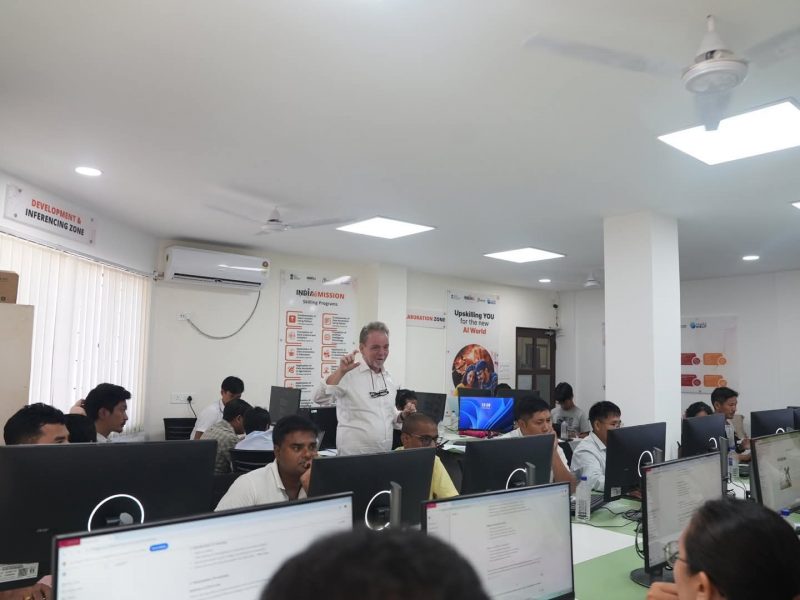Universities want to save energy, in part they see this as their part in addressing the gas crisis, in part it is imposed on them by state governments and they are fearful of the coming electricity bills. The question quickly arose as to whether this means that facilities will have to prepare for an “energy lockdown.” “Rhineland-Palatinate and Bavaria, for example, have told their universities that they expect 15 percent energy to be saved there in the winter. That’s basically an order, says education expert Armin Himmelrath. In Baden-Württemberg, he says, as much as 20 percent has been issued. Without (partially) shutting down the universities, he said, that would be hard to do.” [own translation1]((07.09.2022 | Gaskrise: Möglicher Energie Shutdown an deutschen Unis | DlfNova))
In order to achieve the 15% energy savings expected from public institutions, we will offer lectures as purely online lectures from December 4, 2022 to January 8, 2023.((Energiesparen an der Hochschule Koblenz | hs-koblenz.de. Abruf: 17.11.2022))
And so it is now happening. Koblenz University of Applied Sciences, with around 10,000 students, was one of the first to announce at the end of October: “At Koblenz University of Applied Sciences, lectures will be offered purely as online courses from December 4, 2022 to January 8, 2023 […] During the Corona period, a lot of experience had been gained with digital teaching. Many students are with their parents in the weeks before Christmas anyway. But those who don’t have good WLAN at home or live in a shared flat with noise can still find places to study,…” [own translation]2 In the so-called “digital phase”, as few rooms as possible are to be used, i.e. mainly teaching rooms, laboratories, practice rooms and administration. The use of libraries, refectories and other areas is to be restricted. Teaching (are there actually only lectures at the HS Kopblenz?) is to take place in distance mode.
Opposition and protest: Do not pass on costs to students and leave important facilities open
On Nov, 09th the “Junge Union Koblenz” (JU, the youth organisation of the political parties CDU / CSU) speaks out. They criticize above all that the energy costs are applied to the students. In addition, it is critically noted that there should be no exceptions, that is, laboratories, internships and practical exercises also fall under the savings verdict. “The university’s energy costs are eliminated, but students and faculty have increased energy costs,…” [own translation]3 The party DIE GRÜNEN (Green Party) also argue that closing the university may not reduce energy consumption at all, but that the costs should be redistributed to students and staff who are already particularly burdened. “The university also has a social responsibility. Increased costs for food and energy are already borne by the students. […] However, closing the university would likely result in little savings to society as a whole…” [own translation]4
It is not our job to pay for a failed energy policy.((16.11.2022 | Studenten demonstrieren gegen Schließung der Hochschule Koblenz | Rhein-Zeitung (Paywall)))
Also on Nov. 16, about 200 students protested on the university forecourt, the message: “It’s not our job to pay for a failed energy policy.” The students’ demands are directed at withdrawing the restrictions on library and cafeteria services. In a survey in which 550 students participated, 60% had spoken out against online teaching in December5. In the meantime, the Koblenz case is being negotiated at national level in Germany.6 It is also embarrassing that the U15 chairmen Krausch and Hoch still had J.M. Wiarda promise them in October that “the universities will remain open.”7 and Minister of Education and Research Stark-Watzinger announced via ZEIT-online magazine in August “Universities must remain open”8.
The Narrative of “Sickening Online Teaching”
The comprehensive closure of universities in the Corona semester could be cushioned to a certain extent with the help of digital technologies – as far as teaching is concerned – to some extent, also to the astonishment of the actors themselves. The many surveys, analyses and field reports all point in the same direction: the need to use digital media has made it clear to most students, teachers and staff from institutions and administration what opportunities there are for making higher education more flexible, interactive, individual and international. It has also become abundantly clear that social interaction, direct contact and all “people-bound” forms of work and communication are part of academic education and a basic need that requires a permanent place in the university. At the peak of the learning curve, the participants even came to a consensus that it is not the media format that decides the quality of teaching, and that digital media can also useful in the practical teaching room. Concerns and ignorance about digital media in higher education had decreased significantly. However, this perception then somehow changed – according to my observation9 from the summer of 2021 onwards and subsequently in the botched winter semester 2020/2021, which started with a “Back to Presence”, then was thwarted by the 4th Corona wave10 and finally disappeared in the cable tangle and procurement madness of an just incompletely implementable “hybrid teaching”.
Students basically suffer from digital teaching.11
The narrative of “sickening online teaching” has now taken hold. Online teaching yes, but only with deep regret, because “…unavoidable. The energy savings could not be realized in face-to-face operation. [The president of the Koblenz University of Applied Sciences] is not enthusiastic about it himself, but he has to implement the requirements of the state. In principle, however, he stands by face-to-face teaching.” The SWR report then cannot refrain from claiming again at the end: “Students basically suffer from digital teaching. According to student representatives, students have been affected by many problems in recent years, such as learning difficulties and social isolation, especially due to the Corona lockdowns. Many were still suffering as a result. The mental health challenges that could arise from going online should not be underestimated, he said.”11 In the case of the Junge Union Koblenz (already mentioned above), this attitude is then paired with pithy attributions such as “Students belong at the university and not in front of the laptop.”12.
What we observe is the attribution of an argument that the participants themselves use only marginally and certainly do not put it in the foreground. First and foremost, the students and speakers oppose the passing on of heating costs, the closing of a (their!) social space, the restriction of supply offers and access to places of learning. The burdens of online teaching are a topic, but digital teaching is rightly not understood as the cause of the problems. However, the story of online teaching causing illness is always good for dramatically underlining one’s own positions and assigning responsibility. – Or it serves purposes that are not clear to me. It is somehow not relevant, because following this logic it would be better not to do any teaching at all instead of online offers. It is somehow also part of this that there is still a great conceptual confusion. Sometimes there is talk of “online lectures”, sometimes of “digital teaching”. Then again from “digital lecture mode”, optionally “digital teaching mode”. It seems as if the reference to “face-to-face teaching” (which in reality is also underdetermined) is important if only to have at least a linguistic fallback position.
- all quotes translated by author, please check back source [↩]
- 24.10.2022 | Wie sich die Energiekrise auf die Hochschulen in RLP auswirkt – SWR Aktuell [↩]
- 09.11.2022 | Studierende gehören in den Hörsaal, nicht vor den Latop [↩]
- 16.11.2022 | Grüne fordern Umdenken der Hochschule Koblenz – Grüne Koblenz [↩]
- v. Hagebölling, M. (2022) ‘Hochschule: 200 Studierende demonstrieren Digitalbetrieb im Dezember sorgt für Unmut’, Rhein-Zeitung, 17.11.2022, p. 15 [↩]
- 21.11.2022 | Wegen Sparmaßnahmen: Hochschule Koblenz schränkt Lehrbetrieb ein | faz.net, 22.11.2022 | Energiekrise zwingt Hochschulen zum Sparen: Lehrveranstaltungen wieder digital | dlf-kultur, 23.11.2022 | Hochschulen: Hochschule Koblenz: Energiesparen beschäftigt den Landtag | ZEIT ONLINE [↩]
- 10.10.2022 | “Die entscheidende Botschaft ist: Die Universitäten bleiben offen” – Wiarda-Blog [↩]
- 25.08.2022 | Bettina Stark-Watzinger: “Die Bildungsschere in Deutschland öffnet sich” | ZEIT ONLINE [↩]
- 19.12.2021 | Das Präsenz-Gen in der Hochschullehre | joerghafer.de [↩]
- 20.01.2022 | Face (or not) to Face? | joerghafer.de [↩]
- 16.11.2022 | Universität und Hochschule in Koblenz müssen Energie sparen – SWR Aktuell [↩] [↩]
- 09.11.2022 | Studierende gehören in den Hörsaal, nicht vor den Laptop [↩]



